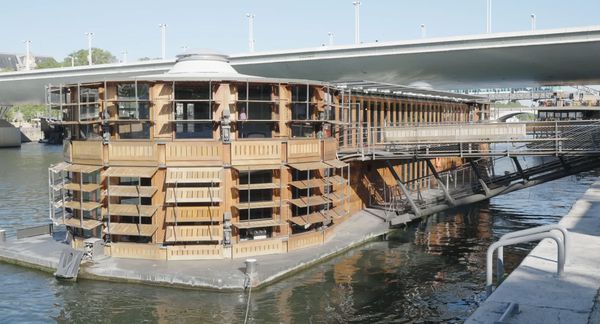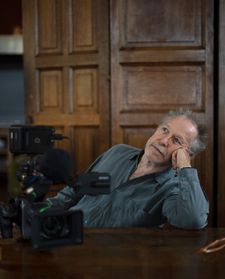 |
| On The Adamant |
Celebrated French documentarian Nicolas Philibert’s On The Adamant ventures inside a place like no other - a home to the transformative power of art. Anchored on the Seine River in Paris, a boat called the Adamant runs daily programs that utilise therapy, education and the arts to reimagine a more humanistic approach to mental health and wellbeing.
In conversation with Eye For Film, Philibert reflected on his career and discussed how the times are positively changing for documentaries.
Paul Risker: A celebrated documentarian, what initially led you to choose documentary filmmaking as a means of expression?
 |
| Nicolas Philibert Photo: Michel Crotto |
Nicolas Philibert: I don't know, because at the beginning of my career I was an assistant director on fiction films. The first film I wanted to make curiously and paradoxically was a documentary. I had seen very few documentaries at that time, and so I can't explain why. Perhaps it was that it seemed easier to do that as a first project.
PR: How do you reflect on those early years and the experience of finding your voice?
NP: It took me several films to find my voice. I want to say that I'm not sure that I've found my voice or my path yet. It's not that I'm starting over from zero because I have a long history in filmmaking now, but with each film one has to face oneself. One has to face doubts, questions and fears. I think these are excellent because they serve as fuel to move forward.
To be a little more concrete, I'll mention that my first film [La Voix De Son Maître] was one I co-directed with someone else [Gérard Mordillat], as if we needed to be two, to give each other the courage to make this film. Then, the next few films were television commissions, so one can't say that these were entirely personal films. The first totally personal film was one that I shot in 1989, which is behind the scenes at the Louvre Museum.
PR: How do you view the way documentary has changed, as an art form and in the way audiences engage with it?
NP: I have the impression that documentaries, or in any case some documentaries, are starting to be considered as if they were a form of cinema in their own right. For a long time, documentary was a genre that appeared to be minor, entirely connected to information and journalism, and considered a reportage. I think that's changing today. Audiences here in France and I hope elsewhere are starting to see and understand that the documentary is a vast territory, and, like fiction, there are different approaches and styles.
[…] What I mean is that a good documentary is not simply connected to the importance of its subject. There's no proportional relationship between the righteousness of a cause that a film is championing and its quality. For example, one can see a very good documentary that is about a minor subject and one can see a very bad documentary that is championing a cause that, in one's eyes, is absolutely righteous. There's no correlation.
 |
| On The Adamant |
PR: What was the seed of the idea from which On The Adamant grew?
NP: I'm very good friends with one of the people that co-founded the Adamant, a psychologist and a psychoanalyst. As you know, it's a day centre that was imagined and founded by a combination of medical personnel, carers, patients and architects, who met for about two years to throw out ideas and dream up this place together.
This beautiful place eventually saw the light and opened 14 years ago. I’d heard about it from my friend before it even existed. Then, one day, about ten years ago, I was invited onto the Adamant to talk about my work.
As you saw in the film, the Adamant is a very hospitable and welcoming place. It's open to the world and all sorts of guests are regularly invited to talk and participate. So, ten years ago, I came onboard, and I talked to a group about my work for two hours. They asked me lots of questions about my films and I found it very stimulating. When I left the boat, I had this idea that maybe I would come back some day to make a film.
PR: Despite progress, mental health is still misunderstood. We live in a culture filled with platitudes and good intentions that are not sufficiently supported practically. On The Adamant documents how we can actively support and empower people to help themselves. In this way, the film challenges the current culture and approach towards mental and emotional wellbeing.
NP: The world of psychiatry is a world that can be disturbing, that can raise questions that sometimes frighten us. It says a great deal about the state of society and the violence of the world, and it teaches you a great deal about yourself.
 |
| On The Adamant |
Often, the people one meets in psychiatry have a great fragility that can remind you of your own fragility. The people you meet are often hyper-sensitive and extremely lucid about their own problems. They are people that are tremendously porous to things, while we who aren't in psychiatry, we have strategies to protect ourselves, to avoid looking at what disturbs us and challenges us head on. Patients in psychiatry don't have that aptitude to avoid looking directly at what disturbs them, that they take so hard. For all these reasons, people in psychiatric institutions or treatment can teach us a great deal and open our eyes to so much. It seems paradoxical, but I'm convinced of it.
PR: With this in mind, did you approach On The Adamant with the hope or an intention of what you wanted the audience to take away from the experience?
NP: I don't make films to tell people what to think, even less to dictate what people should think. I like to consider spectators my equals. I like to think of them as people who can think about things based on the films that I propose. My films are made more to raise questions and to keep certain questions open, than to provide answers. But having said that, if, by deconstructing clichés and representations, my films can modestly contribute to changing the way the spectators see things, why not?
On The Adamant opens in New York on the 29th March, with a national expansion to follow, courtesy of Kino Lorber. It was released in the UK on 3rd November 2023 and is available to stream on Curzon Home Cinema.





















